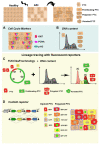Tubular Cell Cycle Response upon AKI: Revising Old and New Paradigms to Identify Novel Targets for CKD Prevention
- PMID: 34681750
- PMCID: PMC8537394
- DOI: 10.3390/ijms222011093
Tubular Cell Cycle Response upon AKI: Revising Old and New Paradigms to Identify Novel Targets for CKD Prevention
Abstract
Acute kidney injury (AKI) is characterized by a rapid deterioration of kidney function, representing a global healthcare concern. In addition, AKI survivors frequently develop chronic kidney disease (CKD), contributing to a substantial proportion of disease burden globally. Yet, over the past 30 years, the burden of CKD has not declined to the same extent as many other important non-communicable diseases, implying a substantial deficit in the understanding of the disease progression. The assumption that the kidney response to AKI is based on a high proliferative potential of proximal tubular cells (PTC) caused a critical confounding factor, which has led to a limited development of strategies to prevent AKI and halt progression toward CKD. In this review, we discuss the latest findings on multiple mechanisms of response related to cell cycle behavior of PTC upon AKI, with a specific focus on their biological relevance. Collectively, we aim to (1) provide a new perspective on interpreting cell cycle progression of PTC in response to damage and (2) discuss how this knowledge can be used to choose the right therapeutic window of treatment for preserving kidney function while avoiding CKD progression.
Keywords: acute kidney injury; alternative cell cycle; cell cycle arrest; chronic kidney disease; fibrosis; mitotic cell cycle; polyploidy; senescence.
Conflict of interest statement
The authors declare no conflict of interest.
Figures



References
Publication types
MeSH terms
Substances
LinkOut - more resources
Full Text Sources
Medical
Miscellaneous

